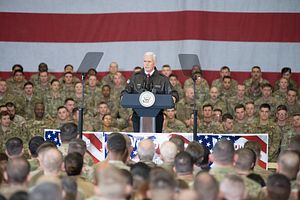In a surprise visit to Afghanistan Thursday, U.S. Vice President Mike Pence met briefly with Afghan President Ashraf Ghani and Chief Executive Abdullah Abdullah at the Presidential Palace in Kabul before addressing troops gathered at Bagram Airfield. In both instances, Pence reiterated President Donald Trump’s commitment to seeing the war in Afghanistan through, highlighting the strategy unveiled by Trump in August after several months of review.
Pence told Ghani and Abdullah he hoped his presence was “ tangible evidence that the leadership of President Trump, our administration and the armed forces that we are here to see this through.”
After meeting with Ghani and Abdullah for 45 minutes Pence flew via helicopter back to Bagram where he told the gathered troops that Trump said, “tell them I love them.”
Pence thanked the troops — “the best of us,” “the world’s greatest force for good” — effusively for their service and said “President Donald Trump is the best friend the Armed Forces of the United States will ever have.” The vice president hailed a bill recently signed by the president which authorizes a $700 billion budget for the military; “the largest increase in military spending in nearly 10 years,” Pence said. (There’s a catch, AP reported, a 2011 budget control law which restricts defense spending to $549 billion annually hasn’t been reversed, yet).
“[W]e’re restoring the arsenal of democracy,” Pence said, pledging to provide the U.S. military with the resources it needs to accomplish its mission.
Pence pitched the Trump administrations South Asia strategy: abandoning “arbitrary timetables,” granting new authority to target terrorists and empowering battlefield commanders.
“Bureaucrats don’t win battles — soldiers do. And under this President, we will never allow bureaucracy to stand in the way of victory,” he said.
He nevertheless went on to say that Trump “has ordered the integration of every facet of American power, as well — diplomatic and economic measures — to achieve a just and lasting peace here in Afghanistan.”
How the administration plans to integrate “ every facet of American power” — i.e. the efforts of various departments — without bureaucracy is unclear.
While Pence trotted out the tropes, he did not quite define victory. In defining the mission, Pence called up the ghosts of 9/11, saying “your mission here in Afghanistan is vital to the safety and security of the American people.”
“[W]e came here to Afghanistan to liberate its people and prevent the terrorist from every threatening our homeland again. And we are staying in that fight and we will see it through to the end.”
Later in his remarks, Pence said “[America’s enemies] must never believe they can wait us out.”
The long war is still on.
In August, before Trump unveiled his new strategy, POLITICO ran a poll which said only 23 percent of voters believed the U.S. was winning the war in Afghanistan, 38 percent said the U.S. was losing and 39 percent had no opinion. Furthermore, the poll didn’t reveal much support for increasing troop levels — a feature of the new strategy — with 37 percent favoring a drawdown and only 20 percent favoring an increase. Such apathy for the war’s prospects and distaste for increased engagement have long bedeviled American politicians split between domestic and international concerns, the urge to cut loses and get out set against the need to score a “win.”
Afghan officials, on the other hand, seem generally pleased with Trump’s strategy. It certainly forestalls the sense of impending abandonment that Obama’s timetables induced and ensures a strong force backs the Afghan security apparatus. In recent weeks, the U.S. Air Force has increased its targeting of Taliban drug production facilities, for example. In addition, the administration continues to press Pakistan on providing a “safe haven” for terrorists, with Pence saying “President Trump has put Pakistan on notice.”

































